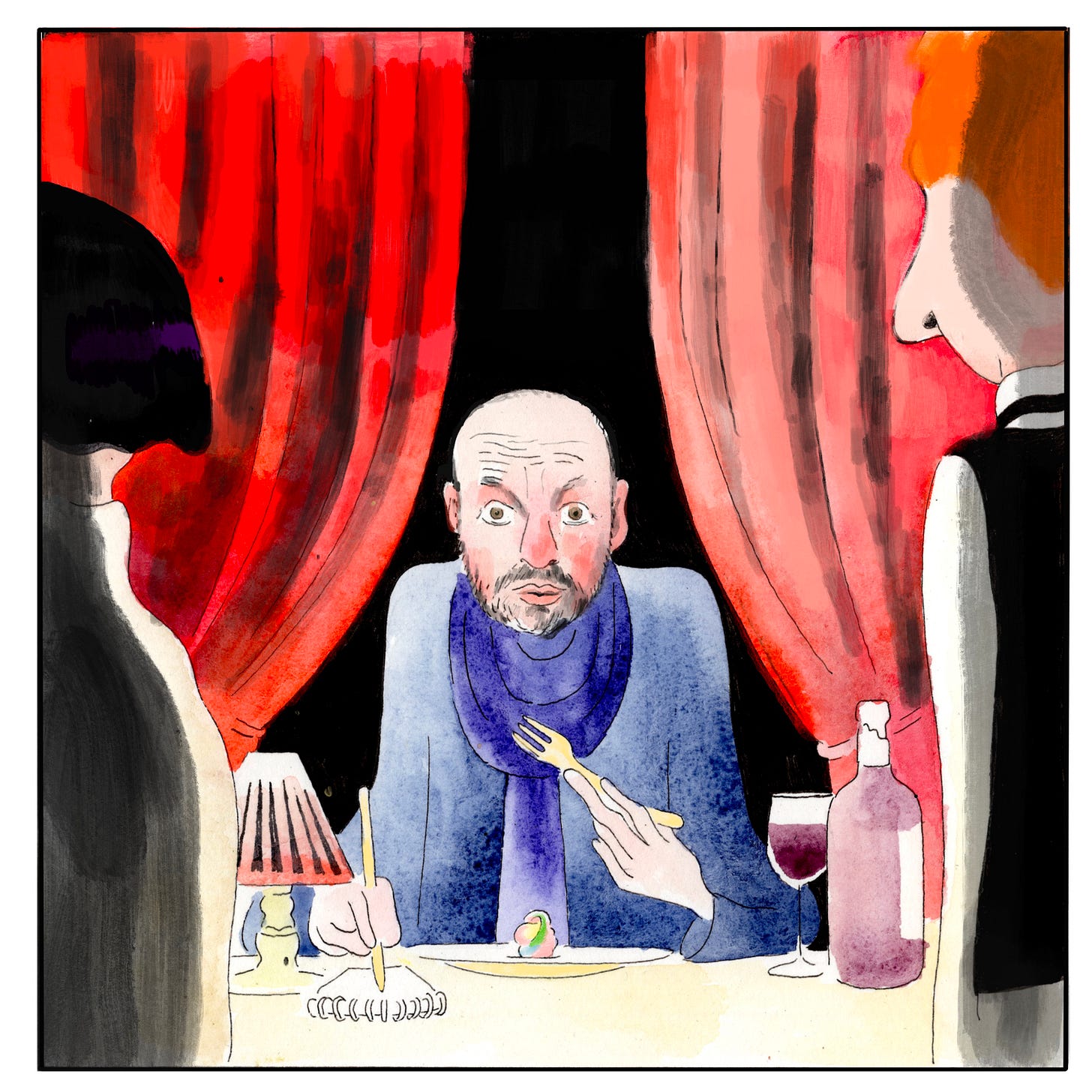The Last Critic In Paris
How French restaurant criticism (almost) killed itself. Words by Vadim Poulet. Illustration by Antoine Cossé.
Good morning and welcome to Vittles. Today’s article by Vadim Poulet is the last in our supplement Vittles Paris. To read the rest of the series, please click below:
The Vittles Alternative Guide to Paris
Rungis: The Market and the City, by Justinien Tribillon
The Story of Soupe Phnom Penh, by Wendy Huynh
‘Welfare is a right, not a privilege’, by Jack Franco
Pourquoi pas?, by Jonathan NunnTo read the entire series, you can subscribe to Vittles for £7/month or £59/year. Your subscriptions help pay all our writers, photographers and illustrators at a fair rate.
In a summer free of major criminal trials, the crime journalist Stéphane Durand-Souffland recently busied himself doing what he likes best: writing brutally honest reviews of French restaurants. Durand-Souffland has been a court reporter at Le Figaro for 25 years, where he has covered every notable case in the country: from the serial killer Guy Georges to the (mostly invented) paedophile ring in the Outreau case. Today, however, Durand-Souffland has become a murderer himself of Michelin-starred restaurants. His victims? Thierry Marx, the chef and former Top Chef judge, whose restaurant at the Mandarin Oriental he wrote up as ‘dishes just ticking over, confusing combinations, a lack of acidity and lightness, no discernible work on bitterness, not a single green vegetable, not a single dessert featuring citrus fruits or seasonal fruits’. Then there’s chef Guillaume Sanchez, whom Durand-Souffland accused, in response to an aggressively flavoured meal at Neso, of running an ‘S&M dungeon’. As for Alain Passard, legendary owner of the three-starred L’Arpege? Durand-Souffland compared him, after being served a litany of repetitive plates featuring the same vegetables, to ‘a director who has all the roles in a blockbuster played by four friends who are recognisable at every turn despite their false moustaches and wigs’.
Durand-Souffland started his parallel career in 2012, when the legendary restaurant critic François Simon – reputedly the inspiration behind Ratatouille’s Anton Ego – asked him to fill in on the food section while he was away. The two Le Figaro writers often went to restaurants together, and Simon had noticed that his colleague shared his love for food and strong opinions. Durand-Souffland found the exercise stimulating, and continued to act as a back-up, even after Simon’s departure in 2013. Since then, Durand-Souffland has interspersed his reporting on criminal and political trials with reviews of restaurants, and has become one of the most precise critics writing in French about the architecture of a dish and its taste. When I called him recently to talk about food, he was passionate about his side job and its particular challenges, telling me that a sausage is ‘harder to describe than a murderer’.
“Durand-Souffland compared [Alain Passard] to ‘a director who has all the roles in a blockbuster played by four friends who are recognisable at every turn despite their false moustaches and wigs’.”
For lovers of bitter and scathing reviews, Durand-Souffland is the one lonely critic left in Paris doing his part, part-time. The epitome of the French food critic immortalised in Ratatouille – severe, hard to please, gifted with absolute taste like some have absolute pitch – no longer exists. With the exception of Le Figaro, France’s main conservative paper, there are no restaurant critics in the dailies. François-Régis Gaudry, a self-described ‘petit con’ who loved to bite the ankles of egotistical chefs when he was a food critic for weekly news magazine L’Express, now has his own radio show and TV show, and has done stints on Top Chef – his career has made it untenable to keep criticising chefs while also being friendly with them. At Le Figaro, Emmanuel Rubin is reduced to penning listicles, only exercising his sharp pen on easy targets and irrelevant restaurants. Libération, the French version of The Guardian, favours trend pieces on food. At Time Out Paris, the anonymity of each of its critics is proclaimed next to their picture, while their best-known reviewer also works as an MC at food festivals and goes on trips with chefs he also reviews. As for François Simon, since he left M Le magazine du Monde in 2018, his former restaurant column changed its format from restaurant criticism to pieces on ‘memorable dishes’ and ‘remarkable kitchen tools’. Promoting his new book, Will I Go Back? (titled after his poetic Instagram reels), Simon told France Inter of his yearning for ‘a time when criticism raised the bar’ with ‘good, well-argued reviews, often a bit vicious’. In another interview, he observed that ‘there is no great food critic anymore’.
It is perhaps a symptom of all this that Paris, the centre of French gastronomy, has never been in more need of a great restaurant critic. Today, the Parisian food media scene has become a never-ending circle of new restaurants hyped for a couple of weeks before the next ones come in, without anyone bothering to say if it is really worth the fuss – an attitude emblematic of a profession that has foregone negativity. If even the guides have stopped guiding us, then, the only thought leaders left are influencers. French restaurant criticism is almost dead, and the weirdest thing about it might be that, one court reporter aside, no one seems to care.
Behind the paywall: the Nazi-origins of French food writing, François Simon and the golden age of restaurant criticism, the blurring of lines today between influencing and criticism, and why Paris is in dire need of a great restaurant critic.


